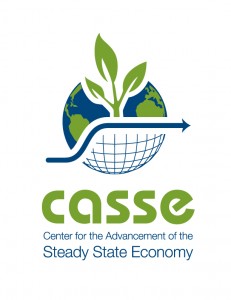Could Obama Be the First Steady-State President?
Dec 13th, 2011 | By admin | Category: Economics and GDP Admin note: This article first appeared on the CASSE blog (Center for the Advancement of a Steady State Economy)
Admin note: This article first appeared on the CASSE blog (Center for the Advancement of a Steady State Economy)
by Brian Czech
Could President Obama be the one who leads Americans to recognize the ever-growing conflict between GDP and the health of the nation? Could Obama be the first to hearken the steady state economy — stabilized levels of production and consumption — as the sustainable alternative? Could Obama be the “steady-state president” we’ve all (well not all, but many of us) been waiting for?
Alas, probably not. The time is not quite ripe enough. Yet it is not quite out of the question, either. Obama shows clear signs of steady statesmanship, and citizens show signs of wanting it.
In “Obama’s New Square Deal,” Washington Post columnist E. J. Dionne Jr. described how “President Obama has decided that he is more likely to win if the election is about big things rather than small ones. He hopes to turn the 2012 campaign from a plebiscite about the current state of the economy into a referendum about the broader progressive tradition that made us a middle-class nation. For the second time, he intends to stake his fate on a battle for the future.”
That’s exactly the type of leadership needed to advance the steady state economy as a policy goal with widespread public support. In particular, we need a focus on “big things,” such as the long-run sustainability of the American and global economies. We need a president who will “battle for the future,” not for another percentage point in next year’s GDP growth.
The progressive tradition Dionne sees Obama adhering to is also conducive to the steady state economy, which is roughly indicated by stabilized GDP and a stable standard of living. Dionne rightly points to Theodore Roosevelt and Franklin D. Roosevelt as primary purveyors of the progressive movement, and sees signs that Obama could channel the Roosevelts into a 21st century New Deal for the middle class. TR and FDR were concerned with the middle class, for sure, but they were concerned with much more as well. They were concerned with truly “big things” such as the long-run sustainability of the nation.
Theodore Roosevelt was the father of the American conservation estate, establishing national forests and parks left and right, as well as establishing the first national wildlife refuge at Pelican Island, Florida in 1903. This original icon of the Republican Party would be seen as an iconoclast today, as the Grand Old Party is the last in line to protect our great natural heritage. “Drill baby drill” is the iconic rhetoric of today’s Republicans. TR made an early escape from Big Money with his Bull Moose Party.
Meanwhile, FDR was the leader in establishing the broad sweep of progressive, professional natural resources agencies and programs we have today. The Soil Conservation Service, Fish and Wildlife Service, and Bureau of Land Management, among many others, were brainchildren of Roosevelt and his savvy secretaries of Agriculture and Interior. FDR and his Cabinet knew all about trade-offs, sacrifice, and “opportunity costs.” They knew you couldn’t have your cake and eat it too. They knew well the trade-off between economic growth and environmental protection. By contrast, today’s Democrats are more likely to muddy the conservation waters with the rhetoric that “there is no conflict between growing the economy and protecting the environment.”
But that brings us back to Obama. He is an exception, at least by today’s standards. He is a throwback to the heyday of smart, progressive politics. He doesn’t insult our intelligence with win-win rhetoric. In fact, Obama hardly even uttered the phrase “economic growth” until the recession made it politically impossible not to. He knows we need a paradigm shift in economic thinking and that sustainability is the watchword for the 21st century.
So perhaps the recession has Obama biding his time, waiting until the coast is clear enough for steady statesmanship. He needs some cover, political cover, in order to talk truthfully about the trade-off between economic growth and environmental protection, economic sustainability, and national security. He needs academics, think tanks, bureaucrats, and a growing base of citizens, national and global, to describe the trade-off between economic growth and national wellbeing.
Otherwise, how can we expect Obama to be the first steady-state president?
